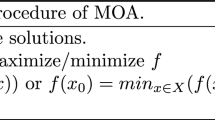Abstract
Recently, several classical Genetic Algorithm principles have been challenged - including the Fundamental Theorem of Genetic Algorithms and the Principle of Minimal Alphabets. In addition, the recent No Free Lunch theorems raise further concerns. In this paper we review these issues and offer some new directions for GA researchers.
Similar content being viewed by others
References
L. Altenberg, The schema theorem and Price's theorem, in: Foundations of Genetic Algorithms 3, Morgan Kaufmann, San Francisco, 1995, pp. 23–49.
J. Antonisse, A new interpretation of schema notation that overturns the binary encoding constraint, Proceedings of the 3rd International Conference on Genetic Algorithms, J.D. Schaffer, ed., Morgan Kaufmann, San Francisco, 1989, pp. 86–97.
H. Aytug and G.J. Koehler, New stopping criteria for genetic algorithms, Review, University of Florida, 1996.
H. Aytug and G.J. Koehler, Stopping criteria for finite length genetic algorithms, ORSA Journal on Computing 8(1996)183–191.
H. Aytug, S. Bhattacharyya and G.J. Koehler, A Markov chain analysis of general cardinality genetic algorithms with power of 2 cardinality alphabets, European Journal of Operational Research, to appear.
S. Bhattacharyya and G.J. Koehler, An analysis of non-binary genetic algorithms with cardinality 2v, Complex Systems 8(1994)227–256.
L. Davis, Handbook of Genetic Algorithms, Van Nostrand Reinhold, New York, 1991.
K.A. De Jong, W.M. Spears and D.F. Gordon, Using Markov chains to analyze GAFOs, in: Foundations of Genetic Algorithms 3, Morgan Kaufmann, San Francisco, 1995, pp. 115–137.
D.E. Goldberg, Genetic Algorithms in Search, Optimization and Machine Learning, Addison-Wesley, Reading, MA, 1989.
J.J. Grefenstette and J.E. Baker, How genetic algorithms work: A critical look at implicit parallelism, Proceedings of the 3rd International Conference on Genetic Algorithms, J.D. Schaffer, ed., Morgan Kaufmann, San Francisco, 1989, pp. 20–27.
J.H. Holland, Adaptation in Natural and Artificial Systems, University of Michigan Press, Ann Arbor, 1975.
G.J. Koehler, S. Bhattacharyya and M.D. Vose, General cardinality genetic algorithms, University of Florida, March 1995.
G.E. Liepins and M.D. Vose, Deceptiveness and genetic algorithm dynamics, in: Foundations of Genetic Algorithms, G.J.E. Rawlins, ed., Morgan Kaufmann, San Francisco, 1991, pp. 36–50.
H. Mühlenbein, Evolution in time and space — the parallel genetic algorithm, in: Foundations of Genetic Algorithms, Morgan Kaufmann, San Francisco, 1991, pp. 316–338.
A. Nix and M.D. Vose, Modeling genetic algorithms with Markov chains, Annals of Mathematics and Artificial Intelligence 5(1992)79–88.
N.J. Radcliffe, Equivalence class analysis of genetic algorithms, Complex Systems 5(1991)183–205.
N.J. Radcliffe, Non-linear genetic representations, in: Parallel Problem Solving from Nature, Vol. 2, R. Männer and B. Manderick, eds., North-Holland, 1992, pp. 259–268.
N.J. Radcliffe and P.D. Surry, Fundamental limitations on search algorithms: Evolutionary computing in perspective, Department of Mathematics, University of Edinburgh, The Kings Building, EH9 3JZ, UK.
J.D. Shaffer, Some experiments in machine learning using vector evaluated genetic algorithms, Dissertation, CS Department, Vanderbilt University, Nashville, TN, 1984.
M.D. Vose, A critical examination of the schema theorem, Technical Report CS-93-212, University of Tennessee, 1993.
M.D. Vose, Formalizing genetic algorithms, Proceedings of the IEEE Workshop on Genetic Algorithms, Neural Networks, and Simulated Annealing Applied to Signal and Image Processing, Glasgow, Scotland, May, 1990.
M.D. Vose, Modeling Alternative selection schemes for genetic algorithms, University of Tennessee, 1995.
M.D. Vose, The Simple Genetic Algorithm: Foundations and Theory, MIT Press, Cambridge, MA, to appear.
M.D. Vose and G.E. Liepins, Punctuated equilibria in genetic search, Complex Systems 5(1991)31–44.
M.D. Vose and A.H. Wright, Simple genetic algorithms with linear fitness, Evolutionary Computation 2(1995)347–368.
D.H. Wolpert and W.G. Macready, No Free Lunch theorems for search, The Santa Fe Institute, 1399 Hyde Park Road, Santa Fe, NM 87501, February 6, 1995.
Rights and permissions
About this article
Cite this article
Koehler, G.J. New directions in genetic algorithm theory. Annals of Operations Research 75, 49–68 (1997). https://doi.org/10.1023/A:1018928017332
Issue Date:
DOI: https://doi.org/10.1023/A:1018928017332




